6 Ways To Reduce The Negative Effects Of Late-Night Eating On Your Body
Eating late at night can have a variety of consequences on your health, including significant sleep and gastrointestinal problems.
If you find yourself needing to eat late at night, here are six things you may do to minimise the bad consequences :

- Choose light and nutrient-dense foods : Choose snacks that are light on your stomach and high in nutrients. Avoid heavy, oily, or sugary foods, as they can be difficult to digest and may interfere with your sleep.
- Include protein and fibre : Protein and fibre can help you feel full and satisfied, which may lower your chances of overeating. Consider snacks like yoghurt with berries, a small handful of nuts, or a slice of whole-grain bread with peanut butter.

3. Keep late-night meals and snacks minimal : Consuming a substantial amount of food close to bedtime can cause discomfort and interfere with your sleep.
4. Mindful eating : Pay attention to the way you eat. Chew your food slowly, allowing the flavours to fully meld together. Eating in front of a computer or TV can cause overeating because of distractions.

5. Choose your mealtime carefully : Try to eat no later than two hours before going to bed. By doing this, you give your body more time to process the meal before going to sleep. Eating late close to bedtime can cause reflux and disturb your sleep.
6. Stay hydrated : Drink plenty of water. Sometimes, feelings of hunger can actually be a sign of dehydration. Having a glass of water before or during your late-night snack can help you stay hydrated and may curb unnecessary eating.

The body of everyone is unique, so what works for one person may not work for another.
Consider adjusting your overall eating schedule if you find yourself eating late at night on a regular basis and experiencing negative effects.
